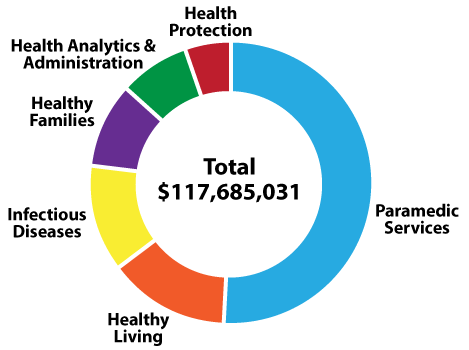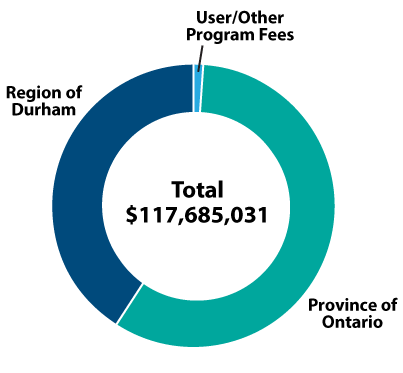
2020 Health Check-Up!
Message from the Commissioner & Medical Officer of Health
 In 2020, the COVID-19 pandemic presented unique challenges affecting everyone. Nearly 9,000 Durham residents contracted COVID-19, and nearly 250 people died from the illness. I am deeply saddened by the significant loss our community has experienced throughout the pandemic and offer my sincere condolences to everyone grieving a loved one.
In 2020, the COVID-19 pandemic presented unique challenges affecting everyone. Nearly 9,000 Durham residents contracted COVID-19, and nearly 250 people died from the illness. I am deeply saddened by the significant loss our community has experienced throughout the pandemic and offer my sincere condolences to everyone grieving a loved one.
The COVID-19 pandemic has impacted residents in numerous ways: livelihoods have been impacted, making it difficult to afford basic needs like food and housing; frontline workers put their health at risk and took on new stresses; residents living in long-term care and retirement homes experienced outbreaks, isolation, illness, and death; business owners were asked to change how they operate; students missed months of in-class learning; educators adapted to new ways of teaching; and loved ones changed and cancelled celebrations, life events and social gatherings.
Durham Region Health Department (DRHD) staff, programs and services were also impacted by the COVID-19 pandemic. Under the Ontario Health Protection and Promotion Act, DRHD is mandated to control the spread of infectious diseases and diseases of public health significance. DRHD is also required to ensure 24/7 response to and recovery from emergencies with public health impacts. Even though DRHD has years of experience managing infectious diseases and outbreaks, COVID-19 presented extraordinary challenges and required an “all hands on deck” approach.
To make DRHD’s COVID-19 response possible, the contributions of our entire team were necessary. This meant that most regular programs and services were put on hold and staff members were re-deployed to the COVID-19 response. This also meant that many of us had to adapt to new schedules, new responsibilities, and constantly changing information. The staff that worked on DRHD’s COVID-19 response included, but was not limited to:
- Case and contact managers, who responded to inquiries, supported residents who tested positive for COVID-19, and followed contacts of confirmed cases.
- Public health inspectors (PHIs), who managed COVID-19 outbreaks and conducted investigations.
- Paramedics, who obtained nasal swabs for COVID-19 testing.
- The Community and Resource Development Team, who worked around the clock to keep residents informed of the rapidly changing situation.
- Epidemiologists, who kept DRHD staff, partners, and residents informed on the status of COVID-19 in our community.
I recognize the heavy burden the COVID-19 response has placed on the entire team at DRHD, and I am proud of our staff for meeting each challenge with dedication, patience, and a willingness to adapt. Often working very long hours in a rapidly changing environment, staff continued to demonstrate compassion and understanding while responding to the needs of our community.
Although 2020 is over, the COVID-19 pandemic continues and the health, social, economic, and emotional toll the pandemic has caused will remain with us for years. With the COVID-19 vaccination roll-out beginning in December 2020, we were hopeful for the future and took this opportunity to turn some attention toward recovery. DRHD recognizes that the COVID-19 pandemic has highlighted long-standing problems that are unequally distributed within our community. As we continue to vaccinate our population and work to recover from the pandemic, DRHD, our partners, and the community must work together to reduce inequities and improve the health of our entire population.
Robert Kyle, BSc, MD, MHSc, CCFP, FRCPC, FACPM
Key Health Department achievements
The 2020 COVID-19 response in numbers
The Health Department engaged in many COVID-19 response activities to reduce the spread of illness and protect the health and safety of area residents. Our response activities throughout the year included:
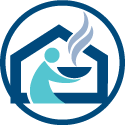
2,638 investigations/inquiries regarding priority population settings
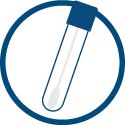
11,087 testing kits prepared by administrative support staff

135,492 COVID-19 phone interactions with residents and community partners

15,121 COVID-19 cases and contacts followed by public health nurses
![]() 13,323 nasal swabs obtained by paramedic services from area residents, school staff and students, clients and staff in child care centres, long-term care and retirement homes, shelters and other congregate settings
13,323 nasal swabs obtained by paramedic services from area residents, school staff and students, clients and staff in child care centres, long-term care and retirement homes, shelters and other congregate settings
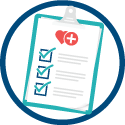
44,442 nursing assessments to determine if further medical intervention is required
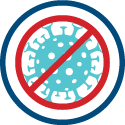
81 outbreaks managed by public health inspectors in long-term care homes, retirement homes and hospitals
![]()
1,336,869 clicks on the link to the Durham Region COVID-19 Data Tracker from durham.ca/novelcoronavirus
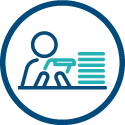
128,560 test results received and distributed for follow-up

62,452 calls to cases and contacts
- 331 investigations by public health inspectors for confirmed positive cases not contacting Durham Health Connection Line for follow-up

- 96 investigations conducted by public health inspectors for people failing to self-isolate under the Section 22 Class Order
- 11,328 investigations initiated in facilities and 23,217 follow-ups with facilities completed by public health inspectors
In addition to DRHD’s responsibilities related to COVID-19, the Health Department operated routine programming when possible. Highlights related to DRHD’s regular programming can be read in this report under the regular programs and services section.
| This timeline provides a month-by-month summary of major decisions, milestones and events related to COVID-19 that had significant impacts on the COVID-19 response in Durham Region. |
|---|
| January: Canada confirms first case of COVID-19. |
| February: First case of COVID-19 reported in Durham Region. |
| March: World Health Organization declares pandemic; Ontario declares emergency and non-essential businesses close. |
| April: Ontario releases framework for reopening the province (3 stages). |
| May: Ontario enters first stage of reopening with spread of COVID-19 stabilizing. |
| June: Durham enters second stage of reopening, loosening restrictions. |
| July: Durham enters third stage of reopening as new daily cases decline further. |
| August: Ontario plans to reopen schools in September amid low numbers of new daily cases. |
| September: Ontario sees rise of new daily cases. |
|
October: With COVID-19 cases on the rise again, October signals the beginning of the second wave of the pandemic and some regions face tougher public health restrictions. |
|
November: Ontario gets new reopening framework; Durham is placed in Yellow – Protect; Orange – Restrict, then Red – Control categories. |
|
December: Canada approves two vaccines; new daily cases at their highest; Ontario enters Provincewide Shutdown. |
COVID-19 response activities
| Case and contact management |
|
Case management involves but is not limited to investigation of disease exposure, monitoring, health education, and contact assessment. Contact management activities include calling identified COVID-19 contacts, assessing exposure risks, providing health education and recommendations based on risks, and monitoring as appropriate.
Working together to limit the spread of COVID-19 Durham Region Health Department (DRHD) staff designed a targeted intervention to manage an outbreak with widespread transmission in a community setting involving a priority population. Case investigators at DRHD identified several cases of COVID-19 associated with a setting which resulted in the declaration of an outbreak. An on-site assessment provided further understanding of the risk of exposure to COVID-19 within the setting. DRHD worked with leaders within the priority population community to ensure impacted individuals were made aware of the risk of exposure to COVID-19 and were advised on public health recommendations including testing. Two mobile testing events were arranged for this priority population. The first event was held at a municipal recreation facility where 73 individuals were tested. This resulted in finding 11 additional cases of COVID-19. Through further contact tracing, additional exposures were identified which led to a second testing event where 20 individuals attended. No new cases were identified from the second testing event. The setting remained closed for the duration of the outbreak and complied with all public health measures. Overall, this was a successful intervention to support a priority population and limit the spread of COVID-19 within the community. |
| Communications |
|
|
| Inspections and investigations |
|
Durham Region Health Department's (DRHD) enforcement efforts helped limit the spread of COVID-19 Throughout 2020, HPD supported the province’s Multi-Ministry Task Force to conduct targeted and focused campaigns in response to DRHD’s local COVID-19 enforcement needs. One campaign involved visiting specific business sectors that presented a heightened risk for COVID-19 transmission. A second campaign, which occurred from December 10 to 13, was focused on COVID-19 safety plans, screening requirements for workers and essential visitors, wearing personal protective equipment, and capacity limits. During the second campaign, provincial officers visited 440 facilities and 63 per cent were found in compliance with the COVID-19 requirements. Thanks to the efforts of HPD staff and partners from other agencies, DRHD was able to provide a more consistent approach to enforcement, which in turn helped limit the spread of COVID-19 locally. This collaboration also allowed DRHD to build stronger relationships with provincial, municipal and regional partners, such as the Ontario Ministry of Labour, Training and Skills Development, Alcohol & Gaming Commission of Ontario, Durham Regional Police Service, municipal emergency and fire services, and municipal by-law departments. |
| Instructions and orders |
|
|
| Outbreak management |
|
DRHD’s efforts to prevent and control COVID-19 outbreaks During the first wave of the COVID-19 pandemic, unfortunately many long-term care homes and retirement homes in Durham Region experienced outbreaks. Each outbreak had a devastating impact on residents, families, and staff. DRHD, in collaboration with Lakeridge Health, and institutions managed the outbreaks and provided infection prevention and control (IPAC) guidance to assist with controlling the spread of disease. While the first wave was devastating, especially in long-term care and retirement homes, DRHD learned invaluable lessons about reducing COVID-19 transmission in high-risk congregate living settings. The lessons learned, in addition to the relationships that were strengthened between DRHD and community partners, helped us better manage outbreaks during subsequent waves. These lessons and strengthened relationships will continue to have benefits beyond the COVID-19 pandemic. DRHD also responded to outbreaks in other settings such as in the community, child care centres, congregate living settings, and workplaces. Throughout 2020, DRHD employed various legal tools to help slow the spread of COVID-19 in these settings. DRHD was the first public health unit in the province to issue a Section 29.2 Order under the Ontario Health Protection and Promotion Act to broker the services of an external agency to oversee the management of an outbreak at a facility. DRHD also issued a Section 22 Class Order requiring workplaces to ensure public health measures were followed during outbreak management. DRHD also issued Section 13 Orders to facilities to reduce or eliminate health hazards. DRHD will continue to provide education on IPAC measures to community partners and support residents, families, employers, and employees in Durham Region to stop COVID-19 outbreaks in the community. |
| School-focused nurses |
|
|
| Surveillance |
|
Durham Region Health Department (DRHD) introduces an innovative tool to track COVID-19 cases In April 2020, DRHD released a new online tool called the Durham Region COVID-19 Data Tracker. The data tracker presents up-to-date information about local COVID-19 cases using an interactive dashboard that can be accessed online by anyone. While navigating the data tracker, users can learn about:
To create this tool, epidemiologists from DRHD worked closely with geographic information system (GIS) specialists in the Region's Corporate Services and Planning & Economic Development Departments to design and continually enhance the tracker. Information in the data tracker expanded in scope and complexity as the number of cases and demand for information grew throughout the pandemic. The data tracker is innovative because it allows people to probe local COVID-19 data using an interactive tool with engaging visuals. Prior to the pandemic, HART was engaged in creating dashboards to showcase data on certain health topics; however, this dashboard has been DRHD’s most comprehensive tool yet. It has provided invaluable learning that HART intends to apply to future work. DRHD has heard a great deal of feedback from community members and partners about the data tracker; however, a favourite accolade came from a Toronto Star reporter who called the data tracker a "thing of beauty". |
| Paramedic services and COVID-19 support |
|
Paramedics obtained 13,323 nasal swabs from area residents, school staff and students, clients and staff in child care centres, long-term care and retirement homes, shelters, and other congregate settings. RDPS supported Sunnycrest Nursing Home during a severe outbreak Beginning November 23, 2020, amid the second wave of the COVID-19 pandemic, Sunnycrest Nursing Home in Whitby experienced a serious and deadly COVID-19 outbreak. Ultimately, this outbreak resulted in 196 positive COVID-19 cases and very sadly took the lives of 30 people. Given the severity of the situation, the Ontario Ministry of Long-Term Care (MLTC) was required to step in to control the outbreak. Due to significant resource constraints, the MLTC sought assistance from local health partners, and by December 3, 2020, Lakeridge Health (LH) assumed temporary management of Sunnycrest Nursing Home. LH quickly recognized that stabilizing the situation was not going to be easy, and engaged RDPS, along with other partners for aid. RDPS quickly alerted frontline staff of the situation, and within hours many staff made commitments to provide help, even on their days off. RDPS worked with its partners on-site to provide care to residents and help ensure a safe environment. In one week, RDPS provided 132 hours of support to the residents and staff at the nursing home. RDPS’ role involved monitoring the well-being of residents, providing care, and helping to meet residents’ immediate needs, particularly related to activities of daily living and social interactions. On January 1, 2020, DRHD declared the COVID-19 outbreak at Sunnycrest Nursing Home over. RDPS was acknowledged and thanked for its care, compassion and dedication while providing aid at Sunnycrest Nursing Home. |
| Testing support |
|
|
Regular programs and services
Due to the demands required of Durham Region Health Department (DRHD) during the COVID-19 response, for most of 2020 many regular programs were suspended to allow DRHD to allocate staff to support pandemic response efforts. Where possible, high-priority programs and services continued in a modified way. From July to September, DRHD had capacity to resume some regular programs given a brief period of reduced COVID-19 caseloads. Restored programs were delivered in a modified way to reduce the spread of COVID-19, including increased physical distancing, virtual visits where possible, and the use of PPE. With the second wave of COVID-19 occurring in late September, many restored programs were suspended again to ensure DRHD could adequately respond to the growing number of COVID-19 cases. The programs and services that continued throughout the pandemic as well as restored programs are described in this section.
| Health Protection |
 High-priority programs were restored where possible including inspections related to food safety, the physical environment, on-site private sewage systems, drinking water and recreational water. High-priority programs were restored where possible including inspections related to food safety, the physical environment, on-site private sewage systems, drinking water and recreational water.
|
| Healthy Families |
|
High-priority programs were restored where possible in a modified manner. This included the Infant and Child Development Program, the Healthy Babies Healthy Children Program (HBHC), and the breastfeeding clinic.
|
| Healthy Living |
|
Prevention of Injury and Substance Misuse
Oral Health 
The Oral Health Division restored high-priority programming in a modified manner. This included reopening the Oral Health Clinic on July 6, 2020 to serve clients under the Ontario Senior Dental Care Program and Healthy Smiles Ontario.
Provided oral health services to 1,527 clients including children, youth, and seniors in need, including screening, preventive services and emergency and essential services. |
| Immunization |
|
The Immunization Program continued to provide high-priority programming in a modified manner to reduce or eliminate the burden of vaccine preventable diseases. 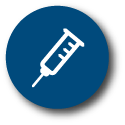
|
| Infectious Diseases Prevention and Control |
|
Infectious Diseases Prevention and Control Program maintained case and contact management activities for priority infectious diseases throughout the pandemic. Sexual Health Clinics were restored in a modified manner to reduce the burden of sexually transmitted and blood-borne infections (STBBIs) and to ensure access to birth control and pregnancy counselling.
|
| Paramedic Services |
|
RDPS continued to deliver quality Paramedic Services to reduce mortality and morbidity related to illness and injury through the provision of pre-hospital advanced life support procedures. Primary program delivery is through RDPS with assistance from the Central Ambulance Communications Centre and local fire department tiered response programs. 
|
| Community and Resource Development |
|
The Community and Resource Development Team continued to provide support to Durham Region Health Department (DRHD) divisions, programs and services, keeping residents informed and helping to enhance compliance with the Ontario Public Health Standards.
|
| Administrative Services |
|
The Administrative Services Team provides effective and efficient support to all Durham Region Health Department divisions, programs, and services to enhance the delivery of the Ontario Public Health Standards and meet all requirements of internal and extensionernal customers.
|
| Privacy and Information Security |
|
The Health Information, Privacy and Security Team works to provide effective and efficient privacy and information security support to all Durham Region Health Department divisions, programs and services that help enhance compliance with applicable privacy and public health related legislation, information security standards and information management best practices.
|
| 2020 Financial Information |
2020 Expenditures
|
Contact Us





 Durham Region Health Department (DRHD) is responsible for communicating medical advice and guidance in a timely, accurate and accessible manner to help local partners and the public understand requirements and preventive actions they can take to minimize the spread of COVID-19. Public health communications occur through various venues and platforms including phone interactions, response to media requests, public appearances through local media outlets, participation in community events, participation on local planning tables, social media, and comprehensive web pages on durham.ca.
Durham Region Health Department (DRHD) is responsible for communicating medical advice and guidance in a timely, accurate and accessible manner to help local partners and the public understand requirements and preventive actions they can take to minimize the spread of COVID-19. Public health communications occur through various venues and platforms including phone interactions, response to media requests, public appearances through local media outlets, participation in community events, participation on local planning tables, social media, and comprehensive web pages on durham.ca.
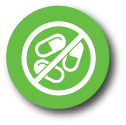 Durham Region Health Department monitors local opioid-related statistics, works with community stakeholders, and provides harm reduction services to prevent and reduce the number of opioid-related overdoses and deaths.
Durham Region Health Department monitors local opioid-related statistics, works with community stakeholders, and provides harm reduction services to prevent and reduce the number of opioid-related overdoses and deaths.
